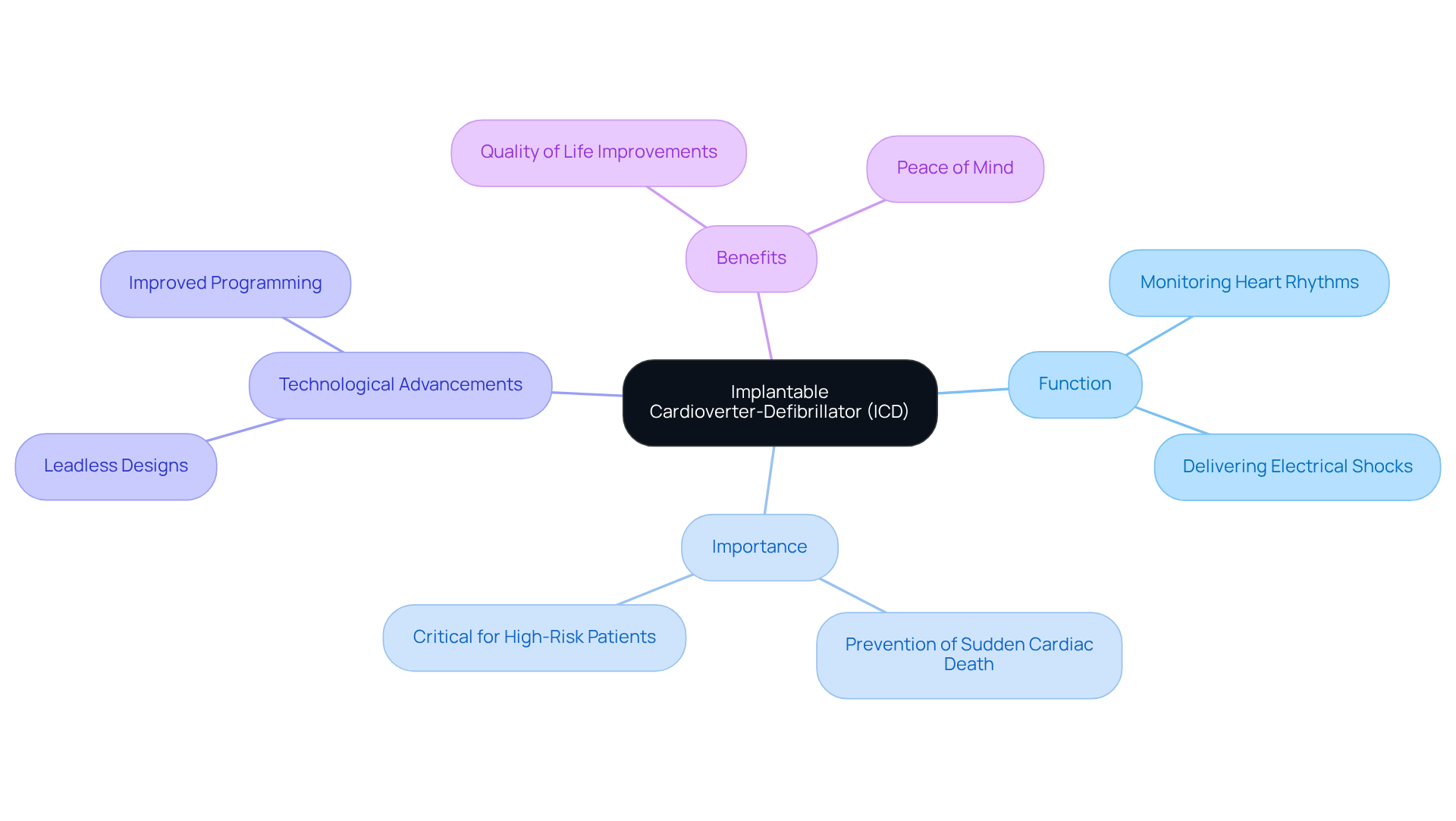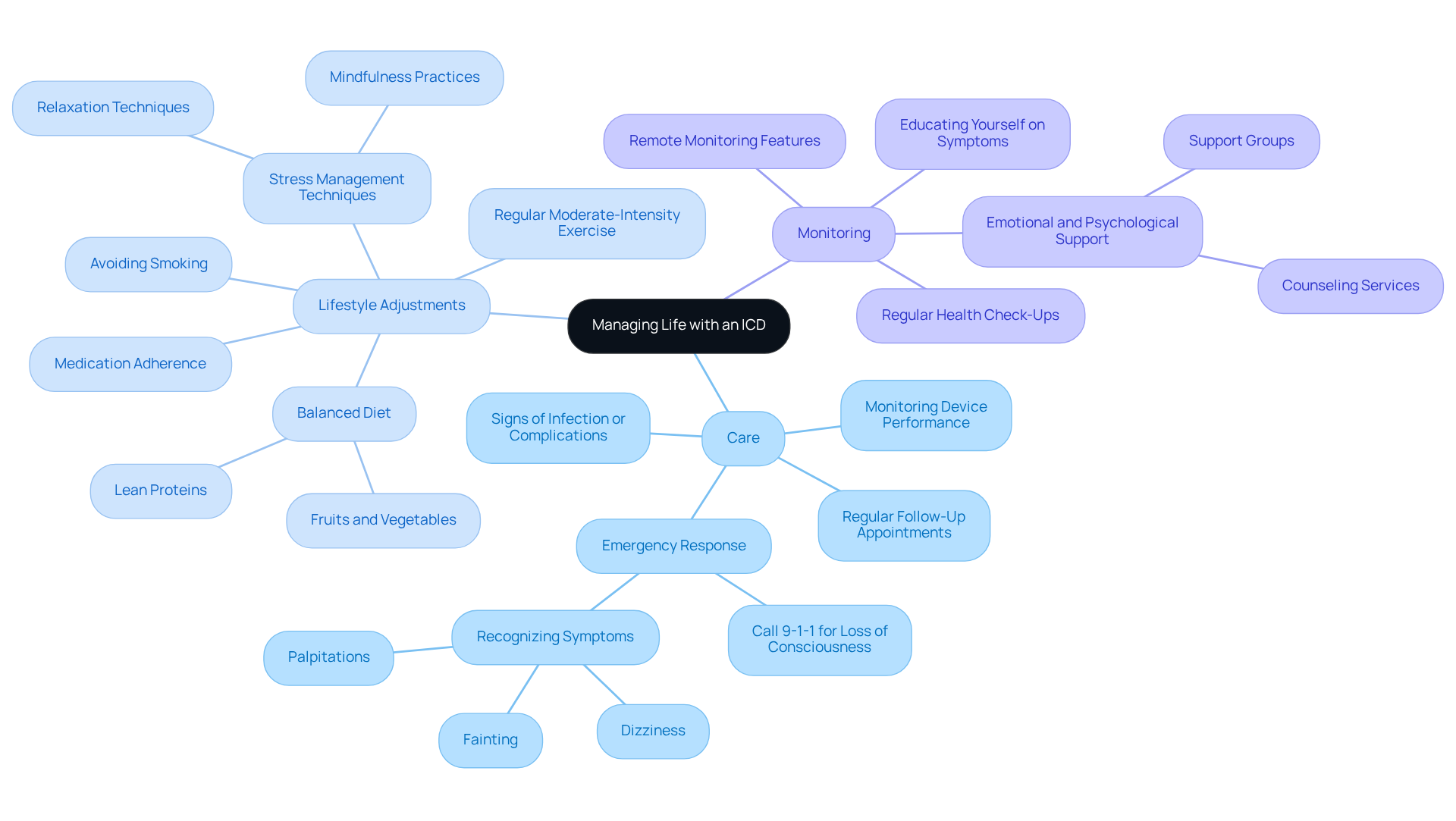


Understanding the implantable cardioverter-defibrillator (ICD) is essential for those at high risk of sudden cardiac arrest due to arrhythmias. This crucial device not only monitors heart rhythms but also plays a vital role in preventing life-threatening situations. Have you or a loved one ever felt anxious about heart health? Knowing that there is a reliable solution like the ICD can bring peace of mind.
The functionality of the ICD is impressive. It continuously observes the heart's rhythm and can deliver a shock if it detects dangerous arrhythmias, effectively saving lives. The implantation procedure is straightforward, and many patients find comfort in knowing they are taking proactive steps towards better heart health. Furthermore, ongoing care and lifestyle adjustments are key aspects of living with an ICD. These changes can significantly enhance the quality of life for patients, allowing them to engage fully in their daily activities.
It’s important to remember that you are not alone in this journey. Many individuals with ICDs lead fulfilling lives, supported by a community of healthcare providers and loved ones. If you have concerns or questions about the ICD, reaching out for support can make all the difference. Together, we can navigate this path towards better health and well-being.
The heart is a remarkable organ, yet for many, it can also be a source of anxiety due to the risks of sudden cardiac arrest. This concern is completely understandable, and it’s where the implantable cardioverter-defibrillator (ICD) comes into play. This device serves as a vigilant guardian, continuously monitoring heart rhythms and intervening when necessary, providing peace of mind to those who need it most.
In this article, we will explore the multifaceted world of ICDs, delving into their life-saving benefits, the intricacies of the implantation procedure, and the essential lifestyle adjustments required for those living with this device.
How can understanding the nuances of ICD technology empower you to take control of your heart health and enhance your quality of life? Together, we will navigate these important topics, ensuring you feel informed and supported every step of the way.
An implantable cardioverter-defibrillator (ICD) is a compact device that is surgically placed in the chest, intended to continuously monitor your heart rhythms. For those at high risk of sudden cardiac arrest due to arrhythmias, particularly ventricular fibrillation and ventricular tachycardia, the implantable cardioverter-defibrillator (ICD) can be a vital lifeline. Imagine having a guardian angel that can deliver electrical shocks to restore a normal heartbeat when dangerous rhythms are detected—this is exactly what the implantable cardioverter-defibrillator (ICD) does, effectively preventing sudden cardiac death.
This automatic intervention is especially crucial for seniors, as studies show that about 85% of individuals who receive an ICD experience an enhancement in their quality of life. Recent advancements in implantable cardioverter-defibrillator (ICD) technology, including leadless designs and improved programming, have made implantable cardioverter-defibrillators (ICDs) even more effective and comfortable to use. In addition to this, real-world examples highlight the ICD's life-saving capabilities. Many individuals who have faced sudden cardiac arrest report feeling reassured knowing their implantable cardioverter-defibrillator (ICD) is consistently monitoring their heart.
The key advantages of utilizing an implantable cardioverter-defibrillator (ICD) extend beyond merely preventing life-threatening arrhythmias. It offers peace of mind, enabling individuals to engage more fully in their daily lives. If you or a loved one are considering an ICD, remember that you are not alone in this journey. Reach out for support and information; together, we can navigate this path towards a healthier, more secure future.

The ICD implantation procedure typically involves several key steps that ensure your comfort and safety:
Preparation: Before the procedure, you will undergo a thorough evaluation. This includes a review of your medical history, a physical examination, and diagnostic tests such as an electrocardiogram (ECG) or echocardiogram. This careful assessment is particularly beneficial for those at higher risk, including individuals with diabetes, hypertension, or a family history of cardiovascular conditions. To help your body prepare, it's advised to avoid eating or drinking for several hours prior to the surgery.
Execution: The procedure is usually performed in a hospital setting under local anesthesia and sedation, ensuring you feel at ease. A cardiologist will make a small incision near your collarbone and gently insert the implantable cardioverter-defibrillator (ICD) leads into your heart through a vein. The device is then placed under your skin, with the leads connected to the implantable cardioverter-defibrillator (ICD). Typically, the entire process lasts about 1-2 hours. At Amavita, our advanced imaging capabilities ensure that these sophisticated tests are seamlessly integrated into your comprehensive care plan, prioritizing your health and well-being.
Recovery: After the procedure, you will be monitored for a few hours to ensure your stability. It's common to experience some discomfort at the incision site, and you will receive guidance on how to care for it and any activity limitations. Complete recovery may take several weeks, during which we will arrange follow-up appointments to assess how the equipment is functioning and to adjust settings as needed. This personalized approach to treatment monitoring is vital for evaluating the effectiveness of cardiac interventions, ensuring that you receive the best possible care and support throughout your journey.

Living with an implantable cardioverter-defibrillator (ICD) necessitates ongoing care and mindful lifestyle changes to enhance your health and guarantee the device functions effectively.
Care: Regular follow-up appointments with your cardiologist are vital for monitoring the ICD's performance and battery life. It's important to stay alert for any signs of infection or complications at the implantation site; timely intervention can prevent serious issues. Did you know that studies show over 95% of cardiac device implantations are successful without complications? This highlights the significance of continuous care. Amavita's CardioElite™ program enhances your experience by providing advanced, real-time diagnostic data and 24/7 cardiology consultation, ensuring proactive management and reducing emergency workload.
Lifestyle Adjustments: Embracing a heart-healthy lifestyle is essential. This means enjoying a balanced diet filled with fruits, vegetables, and lean proteins, engaging in regular moderate-intensity exercise, and steering clear of smoking. Many patients report an improved quality of life when they continue the activities they loved before receiving an implantable cardioverter-defibrillator (ICD). Managing stress through relaxation techniques can also greatly enhance your overall well-being. Remember to follow your prescribed medication regimen diligently, as these are crucial for maintaining heart health. The comprehensive cardiovascular management offered by Amavita, including personalized interventions and advanced risk assessment tools, supports you in making these vital lifestyle changes effectively.
Monitoring: It's important to educate yourself on recognizing symptoms that may indicate a problem, such as palpitations, dizziness, or fainting. If you ever lose consciousness or experience repeated shocks, please call 9-1-1 or your local emergency number immediately. Many ICDs now come equipped with remote monitoring features, allowing healthcare professionals to observe the device's performance and your heart rhythms from the comfort of your home. This not only enhances safety but also provides peace of mind, enabling you to engage confidently in your daily activities. Healthcare professionals emphasize that regular monitoring is critical for achieving the best possible outcomes and addressing any concerns promptly. Learning more about cardiac disease and the implantable cardioverter-defibrillator (ICD) can significantly boost your confidence.
By integrating these elements into your daily life, you can improve your quality of life and effectively manage your heart health, all while being supported by the comprehensive care strategies of Amavita's CardioElite™ program.

An implantable cardioverter-defibrillator (ICD) serves as a crucial safeguard for individuals at risk of life-threatening heart rhythms. This sophisticated device not only monitors heart activity but also intervenes automatically to restore normal rhythms, effectively acting as a lifeline for many patients. Understanding the role and functionality of an ICD is essential for those considering this intervention, as it can significantly enhance both safety and quality of life.
Throughout the article, we have discussed key aspects such as the ICD implantation procedure, the importance of ongoing care, and necessary lifestyle adjustments. From the meticulous preparation and execution of the procedure to the post-operative recovery and the significance of regular monitoring, these elements underscore the comprehensive approach required for effective management of heart health. Moreover, embracing a heart-healthy lifestyle and staying informed about the device's functionality can empower you to live confidently and actively.
Ultimately, your journey with an ICD is not just about the device itself but about the broader implications for your health and well-being. Engaging in proactive care, maintaining a healthy lifestyle, and staying connected with healthcare providers are vital steps in ensuring the best outcomes. For anyone considering an ICD, or for those already living with one, this knowledge is not just informative—it is a pathway to a healthier, more secure future. Remember, you are not alone in this journey; support is always available.
What is an implantable cardioverter-defibrillator (ICD)?
An implantable cardioverter-defibrillator (ICD) is a compact device surgically placed in the chest that continuously monitors heart rhythms and can deliver electrical shocks to restore a normal heartbeat when dangerous rhythms, such as ventricular fibrillation and ventricular tachycardia, are detected.
Who can benefit from an ICD?
Individuals at high risk of sudden cardiac arrest due to arrhythmias, particularly seniors, can benefit from an ICD. Studies show that about 85% of those who receive an ICD experience an enhancement in their quality of life.
How does an ICD work?
The ICD automatically monitors heart rhythms and intervenes by delivering electrical shocks to restore a normal heartbeat when it detects dangerous arrhythmias, effectively preventing sudden cardiac death.
What advancements have been made in ICD technology?
Recent advancements in ICD technology include leadless designs and improved programming, which have enhanced the effectiveness and comfort of these devices.
What are the emotional benefits of having an ICD?
Beyond preventing life-threatening arrhythmias, an ICD offers peace of mind, allowing individuals to engage more fully in their daily lives, knowing their heart is being consistently monitored.
What should someone consider if they are thinking about getting an ICD?
If you or a loved one are considering an ICD, it is important to seek support and information, as you are not alone in this journey toward a healthier, more secure future.